the Y
the Y

Today we remember and honour the brave young ANZAC heroes who went to war, and those who were injured and lost their lives in service. We owe a lot to young people. Young people have and always will be leaders of today and not just tomorrow.
During WW1, Australians saw their young forces display what is now known as the legendary “ANZAC spirit” – qualities including endurance, courage, ingenuity, good humour and mateship. We value young people, they are passionate, committed and capable of creating a better world.
We also remember our young First Nations people who fought, and died, and sadly were not acknowledged. And we remember and honour our Australian YMCA representatives who served on frontlines and around battlefields, and those who were injured and died in service.
YMCA Representatives:
We remember and honour all who served and lost their lives on our behalf. |
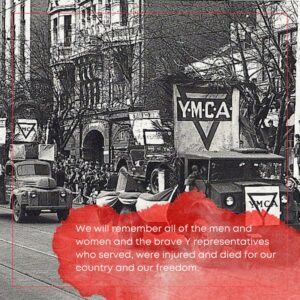 |
World War 1 – YMCA Representatives who were wounded and lost their lives in service
YMCA Representatives were welfare and recreation officers, who worked within the armed services. Along with the Red Cross and Salvation Army, the YMCA Representatives were commissioned to look after the physical, mental and spiritual needs of the young soldiers.
The YMCA established fundraising drives, hostels for groups, social huts, training camps, refugee relief, troop welfare in POW camps, and rest huts and canteens at the frontlines for troops.
YMCA huts were either transportable timber frame buildings, or often a dugout in the trench with the troops, designed to be a homely environment where troops could go for a sense of peace, comradeship, and refreshment.
YMCA raised over $150 million in financial welfare, had 250,000 YMCA personnel in the theatre of war, and established over 800 canteens and huts across the Middle East and France.
See the ANZAC YMCA tribute video by Y WA’s Director, Bruce Porter here.
They reported to the YMCA governance structure, and held honorary officer status, lived normally within the Officer’s Mess, but were not commissioned officers.
See more details about the work of YMCA Representatives, in a presentation compiled by the grandson of a YMCA Representative (Lt. Frank Grose’s) here.
Names of 8 YMCA Representatives who died or were wounded in service:
| YMCA Representatives – Civilian Honours
YMCA representatives did not receive military honours, but they did receive civilian honours. Their areas of work were in France, Belgium, Italy, United Kingdom, Egypt, Sinai and Palestine. Mobile YMCA Representatives also worked on troops ships, returning home. |
 |
| ANZAC Hostel
The YMCA operated a hostel, in Cairo known as Anzac Hostel. One of the reports we have, In a 12-month period, they provided 207,000 meals, 32,500 beds, 7,300 hot baths, 100 concerts, Some of the solder’s said it was: “An oasis in a desert of dirt” “Absolutely the best feed since Australia” “Like heaven after four months on the Sinai Peninsula” |
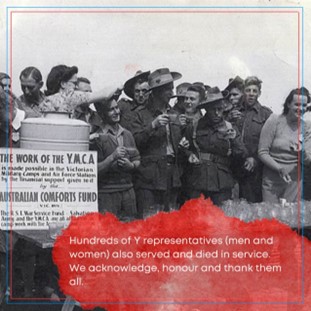 |
The YMCA was proud to play a small but significant role supporting our ANZAC men and women during WW1, providing our diggers recreation opportunities, postal services, and home comforts.
Our social centres were initially set up in military camps in Australia, before being stationed at every camp in every country where our troops served. We were privileged to bring them arts and crafts, games, sports, film screenings, and everything in between.
Serving those who serve is a great honour, and it is important we remember the great sacrifice they made. Please take a moment today to reflect and pay tribute to the extraordinary people who risked everything to give us everything. Lest we forget.
| Example of the work of the YMCA WW1
YMCA Representative’s worked as a Welfare/Recreation Officers with troops at Base Camps, forward areas and at the front line. During the WW1 Ypres fighting in 1917, the YMCA Representatives accompanied the troops well up into the firing zone, and during the days of the heaviest fighting distributed without any regards to their safety many thousand gallons of cocoa, and thousands of packets of cigarettes and biscuits. Men proceeding to and from the line, walking wounded and stretcher cases, were served with hot refreshments under the most difficult circumstances, despite the limits of the accommodation available. |
| The Australian YMCAs program of free distribution from its thirteen centres in France during the fighting, September 20 – November 15, 1917, was the biggest carried out. Cocoa 18,200 gallons, sugar 1216 lbs., milk 6,360 tins, cigarettes 150,000 serves, biscuits 239,663 packets, cakes 256 dozen, syrup 284 tins, chocolate, matches 118 dozen, candles 12lbs. fruit 67 tins, tea & coffee 23,500 gallons equal to 376,000 cups. A 35-page report of YMCA activities in the Near East, gives details about the conditions at Gallipoli, and hardship suffered by all personnel (extract on right). There is a description of the YMCA dugout against the cliffs of Anzac Cove, to save it being hit by the shelling. The dugout was hit several times, during the campaign. Food supplies were very scarce at the beach, and we have an archived report telling us how Navy personnel were stealing supplies, such as food, chocolate etc. from the ships, and bringing those supplies to the beach, and selling them at exorbitant prices. |
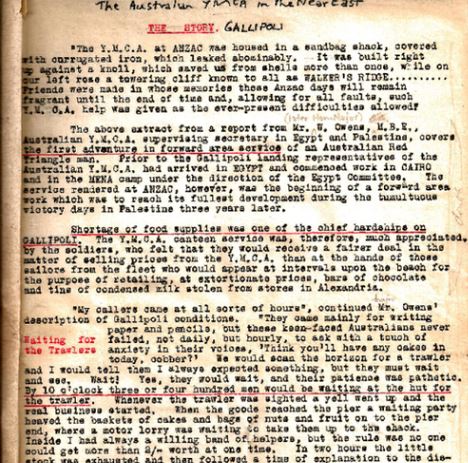 |
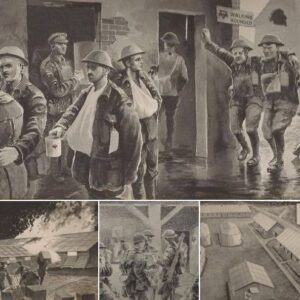 |
Capturing the work of the YMCA in WW1 William Dunford was a special YMCA war artist in France during WW1 He completed 67 drawings of YMCA activities – see some of his drawings (left). Drawings of the walking wounded, showing the YMCA hut on fire after shelling,
|
| Thank you to our Life Governor & Volunteer Military Historian, John Bindon
John Bindon, Life Governor and Volunteer Military Historian for Y Australia, has been an incredible asset for The Y, dedicating hours of his time to ensure that our historical records are John also self-funded visits to the UK’s historical YMCA sites (like Weymouth), as well as several trips to Canberra, as fact-finding missions. We thank John for his excellence in voluntary service to the Y. See John’s interview on Y Australia’s military history here.
|
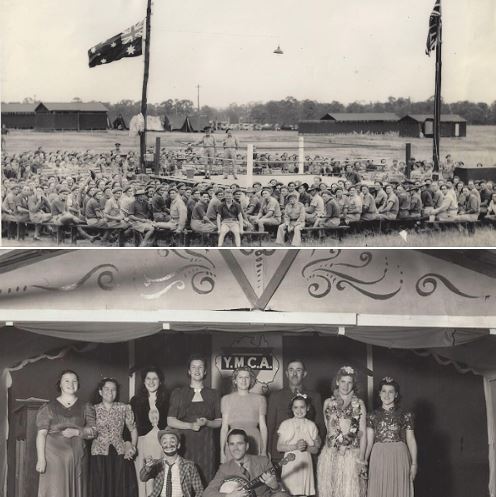 |